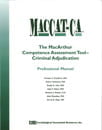
The MacArthur Competence Assessment Tool-Criminal Adjudication maccat-ca
For: Evaluate a defendant's capacity to proceed to adjudication in individuals ages 18 years of age and older
Reading Level: Adult - Elder Adult
Format: Paper-and-Pencil
Length: 25 to 55 minutes
Scoring: Hand Scored
Printed Forms & Handscoring Materials
Test forms, response booklets and scoring reference manuals.
MacCAT-CA Interview Booklets (10)
MacCAT-CA Interview Booklets (20)
Authors
Steven K. Hoge, MD, Richard J. Bonnie, LLB, Norman G. Poythress, PhD, John Monahan, PhD
Description
The MacCAT-CA is a 22-item structured interview for the pre-trial assessment of adjudicative competence. This instrument uses a vignette format and objectively scored questions to standardise the measurement of three competence-related abilities.
Understanding capacity for factual understanding of the legal system and the adjudication process.
Reasoning ability to distinguish more relevant from less relevant factual information and ability to reason about the two legal options: pleading guilty or not guilty.
Appreciation capacity to understand their own legal situation and circumstances.
The MacCAT-CA begins with the presentation of a brief vignette describing a hypothetical crime upon which the 8 Understanding and the 8 Reasoning items are based. The 16 items involve queries about prosecution of the hypothetical defendant. This approach was designed to introduce legal issues in a way that distances the defendant from the specifics of their own case. The six Appreciation items query defendants about their attitudes and beliefs concerning the legal process involved in their own cases.
The format of the MacCAT-CA Interview Booklet facilitates easy administration, recording, and scoring of the defendant’s responses. Items appear on the right-hand page of the Booklet. The facing page contains scoring criteria for that item. The examiner assigns a value of 0, 1, or 2 based on the scoring criteria. The final page of the Booklet is a Scoring Summary form for transferring and summing the item scores for Understanding, Reasoning, and Appreciation. The MacCAT-CA Professional Manual presents guidelines for the clinical interpretation of these three measures based on a national norming study of 729 defendants. Score ranges are provided for three levels of impairment (none or minimal, mild, or clinically significant) for each measured ability. The MacCAT-CA Interview Booklet also provides space for examiners to record case-specific observations that may be relevant for follow-up.
The Professional Manual presents important findings from the MacArthur “field studies” and the NIMH “norming” study that supports the use of the MacCAT-CA in clinical evaluations of adjudicative competence. The MacCAT-CA has been validated with three groups of criminal defendants with the following characteristics: (a) randomly selected jail inmates whose competence was not in doubt, most of whom had neither active nor prior mental health problems (n = 197), (b) jail inmates whose competence was not in doubt, but who were currently receiving treatment for a variety of mental disorders (n = 249), and (c) adjudicated incompetent to proceed as a result of mental illness (n = 283).
The MacCAT-CA is considered appropriate for use with both felony and misdemeanor defendants aged 18 years and older. It may be used in inpatient, outpatient, forensic and correctional settings both prior to, and subsequent to, adjudication of competence to proceed with the criminal process. It may also be used to assess treatment progress with respect to restoration of competency.
NB: Prices are in Australian dollars inclusive of GST. NZ customers need to log in to view ex-GST prices.



